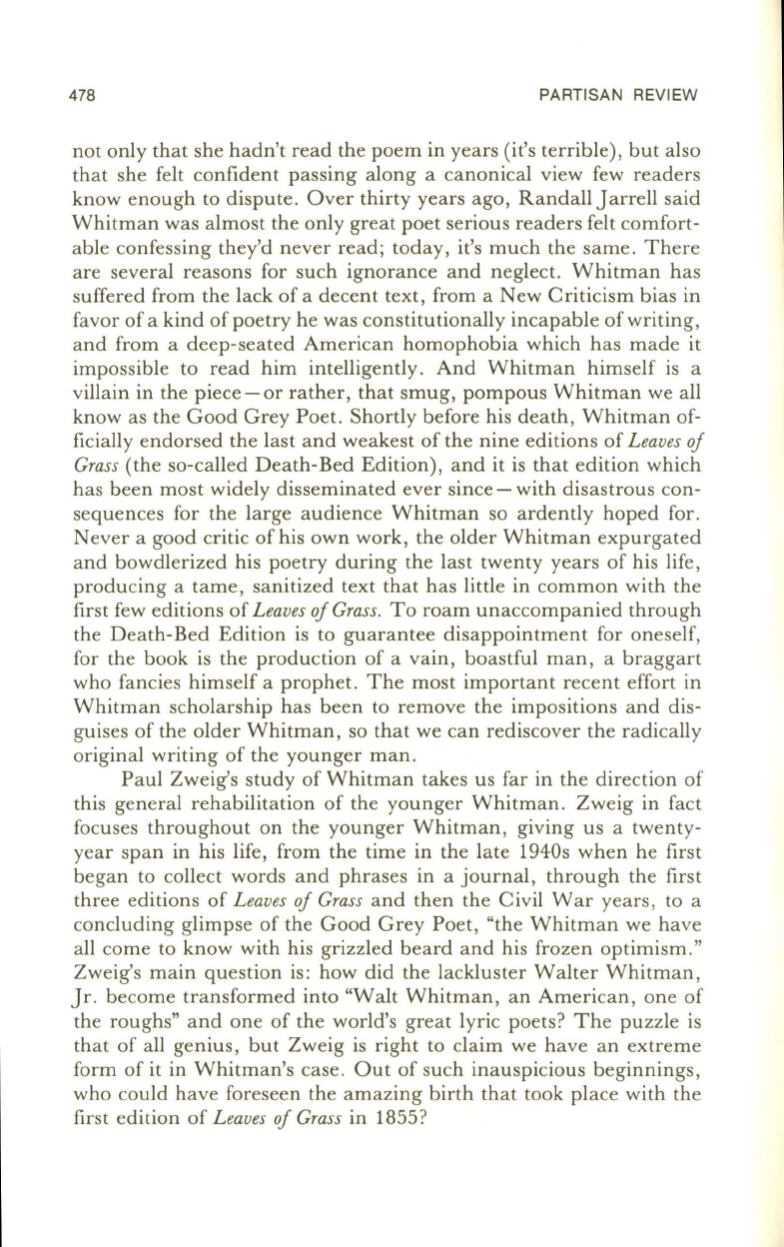
478
PARTISAN REVIEW
not only that she hadn't read the poem in years (it's terrible) , but also
that she felt confident passing along a canonical view few readers
know enough to dispute . Over thirty years ago, Randall Jarrell said
Whitman was almost the only great poet serious readers felt comfort–
able confessing they'd never read; today, it's much the same . There
are several reasons for such ignorance and neglect. Whitman has
suffered from the lack of a decent text, from a New Criticism bias in
favor of a kind of poetry he was constitutionally incapable of writing,
and from a deep-seated American homophobia which has made it
impossible to read him intelligently. And Whitman himself is a
villain in the piece-or rather, that smug, pompous Whitman we all
know as the Good Grey Poet. Shortly before his death, Whitman of–
ficially endorsed the last and weakest of the nine editions of
Leaves of
Grass
(the so-called Death-Bed Edition), and it is that edition which
has been most widely disseminated ever since - with disastrous con–
sequences for the large audience Whitman so ardently hoped for.
Never a good critic of his own work, the older Whitman expurgated
and bowdlerized his poetry during the last twenty years of his life,
producing a tame, sanitized text that has little in common with the
first few editions of
Leaves of Grass.
To roam unaccompanied through
the Death-Bed Edition is to guarantee disappointment for oneself,
for the book is the production of a vain, boastful man, a braggart
who fancies himself a prophet. The most important recent effort in
Whitman scholarship has been to remove the impositions and dis–
guises of the older Whitman, so that we can rediscover the radically
original writing of the younger man .
Paul Zweig's study of Whitman takes us far in the direction of
this general rehabilitation of the younger Whitman. Zweig in fact
focuses throughout on the younger Whitman, giving us a twenty–
year span in his life, from the time in the late 1940s when he first
began to collect words and phrases in a journal, through the first
three editions of
Leaves of Grass
and then the Civil War years , to a
concluding glimpse of the Good Grey Poet , "the Whitman we have
all come to know with his grizzled beard and his frozen optimism. "
Zweig's main question is : how did the lackluster Walter Whitman ,
Jr . become transformed into "Walt Whitman, an American , one of
the roughs" and one of the world's great lyric poets? The puzzle is
that of all genius, but Zweig is right to claim we have an extreme
form of it in Whitman's case . Out of such inauspicious beginnings,
who could have foreseen the amazing birth that took place with the
first edition of
Leaves of Grass
in 1855?


